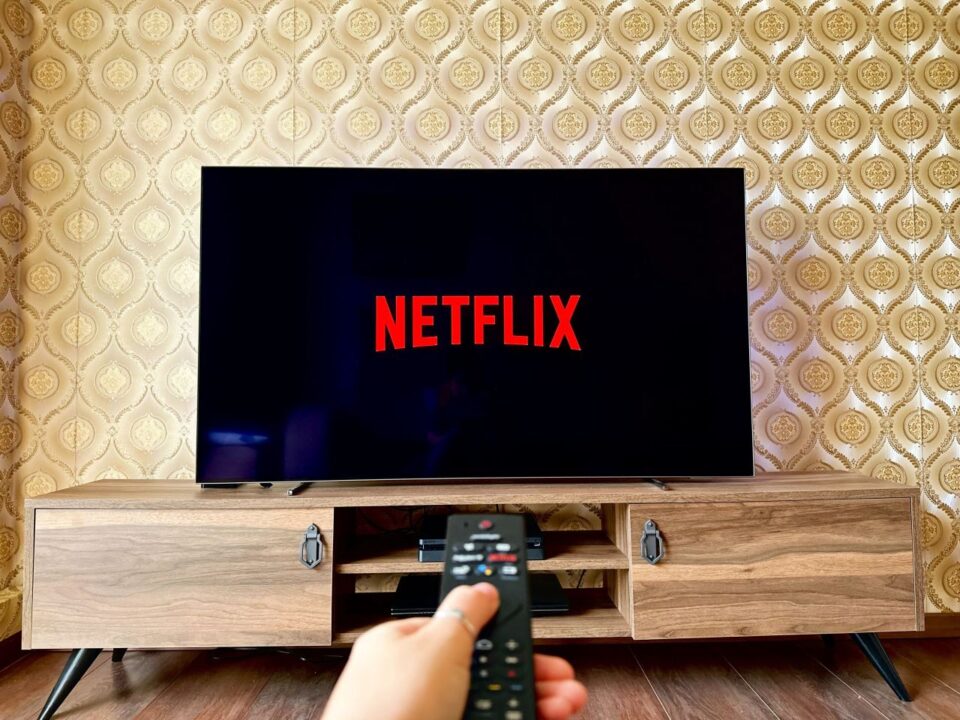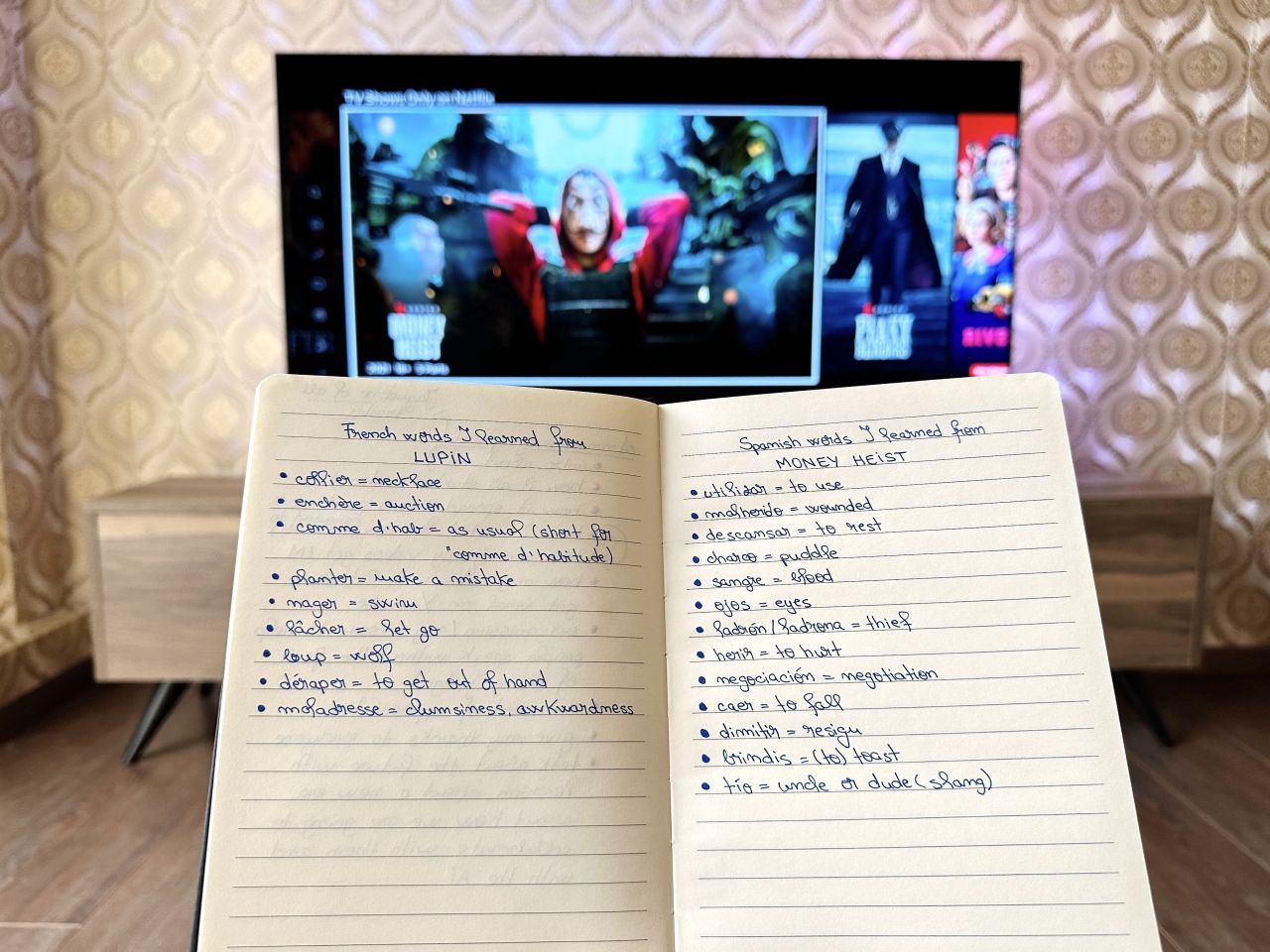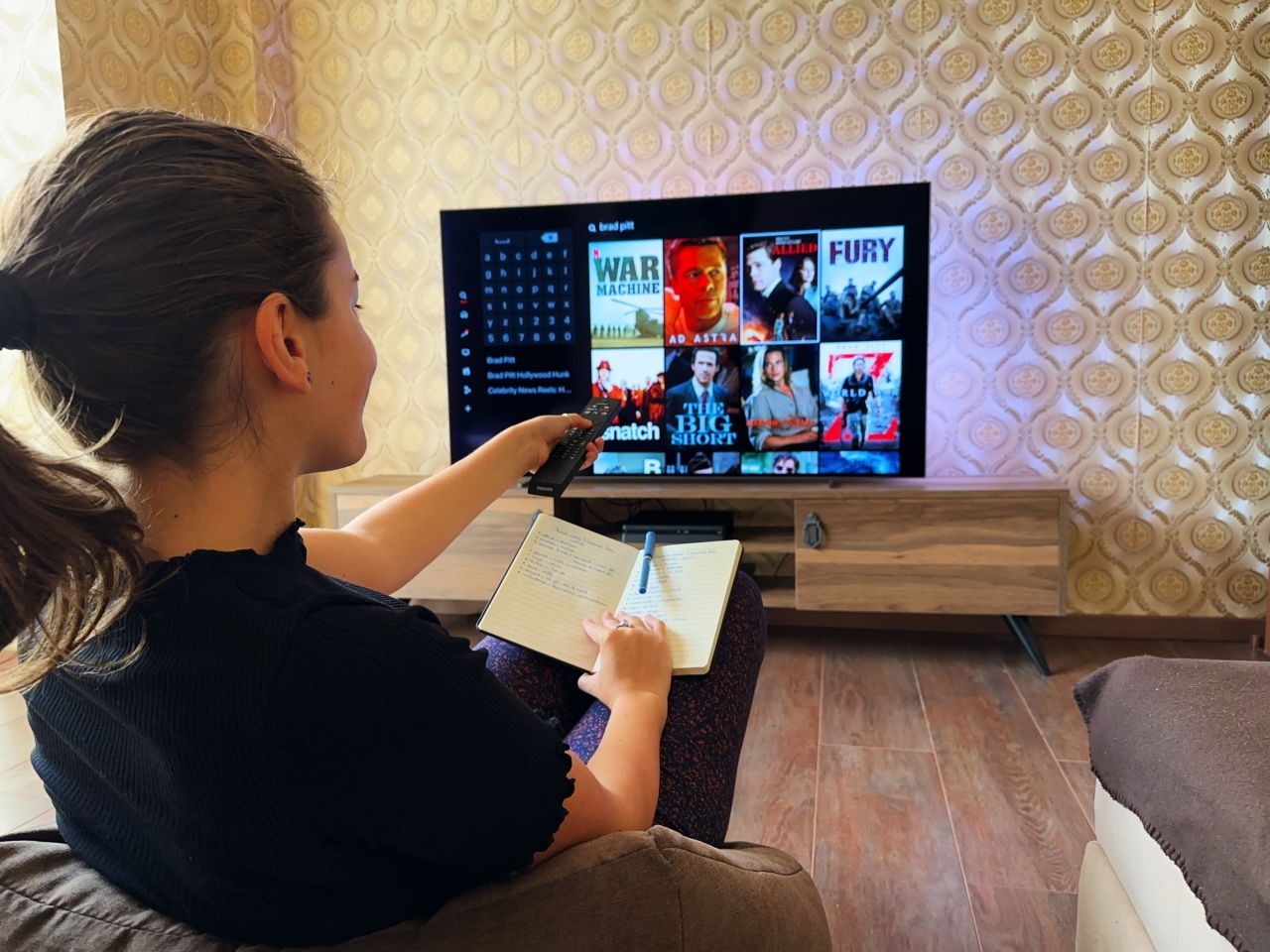Your Travel Guide for The Next Trip to Israel: Tips & Travel Phrases
From weather, typical costs to Hebrew words and Hebrew phrases every traveler needs to know, here is the ultimate travel guide for your next trip
Turn binge-watching into study time. 🎞️✅

Language learning through TV shows and films sounds like a scenario straight out of science fiction, doesn’t it? Yet, it’s not. You might be thinking, “Why should I even bother googling this? It can’t be true.” But here you are. To save you some time: yes, you can learn languages from TV. Context plays a vital role in comprehension and retention when it comes to language learning, and what textbook can provide a more immersive visual context than “The Lord of the Rings” or “Game of Thrones”? Probably none.
I grew up in Eastern Europe in the ‘90s and learned most of my English by watching cartoons and later movies. If only learning French later in school had been as easy! Luckily, the movie industry isn’t going anywhere, and I can catch up on my French by watching “Lupin” on Netflix. Oui, monsieur!
But what about you? What language do you want to learn? Spanish or maybe Korean? By the way, do you know what these two languages have in common? Two very popular Netflix series that feature characters wearing red coveralls. I’ll let you guess the answer.
Now, stick around if you want to find out more about my experience and gain some tips on how you can maximize your binge-watching and learn languages through movies and TV shows.
Learning a language by watching TV shows and films works for two main reasons: visual context and addictiveness. There may be many more reasons behind this, but these two are the most important ones. Let’s see why.
First of all, as already mentioned, context plays a vital role in comprehension and retention. With movies and TV shows, you don’t only get general context but also visual and auditory context. Examples can include facial expressions, body language, and paralinguistic sounds such as gasps, moans, and sighs, forming a multisensory guide to understanding. Not to mention the fact that you can see how certain vocabulary might be used in different situations.
Additionally, changes in the music, background noise, or special effects can help viewers guess what might happen next in the story or what words might be used. This does more than just expose you to a new language. It also helps you see how the way people talk and the tone they use can change depending on what they’re feeling. It literally puts everything into context.
Yet, the best thing about learning a language from movies or TV shows is natural conversations. Things people actually say in real life. If you’re lucky enough to watch a well-written film or series, conversations should flow naturally. That is unlike textbooks, where conversations seem forced. “How are you?”, Alex asks Anna, who then responds, “I am good. How are you”. In real life, people never speak in such a simple manner. Don’t you think?
For example, watching South American or Spanish soap operas is a great way to learn Spanish. Although they tend to be a bit overly dramatic, this will actually boost the learning process. It’s the out-of-the-ordinary that we tend to remember. The stuff people actually say outside the classroom.
There’s no denying that watching TV series and movies is addictive. While inch-thick textbooks can become dull after a while, a TV series you like will keep you glued to the screen until the end. That’s why it’s called binge-watching.
So why is this important? Because combining TV watching with language learning it’s a win-win situation. Let’s say you just started watching “Dark” on Netflix. You’ll not only get to watch one of the best German series ever made, but you’ll also learn German in the process. Now, don’t imagine that 3 seasons of “Dark” are enough to make you fluent, but they will certainly help. The more you watch, the more German words you will pick up.
The effectiveness of TV and film in language learning is in its power to help you learn new vocabulary naturally. You watch, you learn. The only condition is to pay extra attention.
It’s possible to learn languages through movies and TV shows. But don’t imagine you’ll wake up one day knowing French after watching a couple of French movies.
Nope. It doesn’t work like that. If your objective is to learn the language, you have to put in some extra effort and attention. Here are the tips that helped me learn a language while watching movies and TV shows.

Learning a language by watching TV will not only teach you the real language, it will also help you learn what’s the proper intonation and articulation for it. So here’s how to make the most of it:
The bottom line is: imitate the characters as much as you can. After all, it should be a fun activity to do, right?
Another great thing about learning a language from TV series and films is being able to experience cultural understanding and immersion. As you probably already know, knowing the language is not enough. You also have to understand the culture and even history around it.
The accessibility of foreign films and TV shows allows viewers to travel through the screen to far-off lands and times. This experience enables a deeper comprehension of the cultural subtleties that may not be captured in textbooks or traditional language classes. For many language learners, this adds an exciting dimension to their educational experience. Take, for example, the movie “Seven Samurai”, which presents a fascinating image of 1586 Japan.
Of course, if you want to learn about the current situation, you’ll have to watch movies and TV shows set in the present day. A good example of modern-day Japan is the highly acclaimed movie “Drive My Car” (2021).
Even within a single country, films and TV shows can capture the diversity of regional dialects, customs, and traditions. For instance, the difference between urban and rural life, young and old generations, or various social classes can be clearly depicted, offering a more comprehensive picture of society. Watching a wide array of content can, therefore, provide a multi-faceted understanding of the place and its people.
The potential downside is that, at times, films and TV shows might depict a romanticized or stereotyped version of a culture. This can lead to misunderstandings or oversimplified views. So it’s essential to approach such content carefully.
In the age of streaming services, where a plethora of international content is available at one’s fingertips, the impact of films and TV shows on language and culture understanding has never been more potent. It offers a window into the soul of different societies, enabling people to explore, learn, and grow without ever leaving their living rooms. Whether it’s delving into historical Japan from a Kurosawa classic or navigating modern-day South Korea through the work of Bong Joon Ho, these media provide valuable tools for language learning and cultural exploration.
Netflix has taken the world by storm in recent years. We can’t help but marvel at its success. It’s easy to use, it’s addictive, and it’s a great tool for anyone wanting to learn a new language. Why? Because you have a lot of options for audio and subtitles – especially if you use a VPN.
Let’s admit it. Having your favorite actor speaking in your target language whenever you turn on your TV makes it easier to grasp the accent and pronunciation of native speakers.
Do you want Brad Pitt to teach you Spanish? Great! Then turn on Netflix, look for “7 Years in Tibet”, and change the audio to Spanish. Not everyone loves dubbed versions of movies, but this is a very useful way to learn the language you want to learn. If you previously saw the film in its original English, it’s even better because it will be easier to pick up new words in Spanish. Once you feel comfortable, you can switch the subtitles to Spanish as well.

Another thing you can do is watch the movie with its original sound (if you’re unhappy with dubbed versions) and switch the subtitles to Spanish. You’ll do this for a long while, but the final level is to watch a movie in Spanish with no subtitles. Fingers crossed!
Now, I’m not saying you shouldn’t use other streaming services as well, but Netflix seems to offer the most varied catalog of foreign language audios and subtitles. Just watch and learn!
Grab the popcorn and hit play.
Oh, wait. Not so fast. First, you’ll have to choose a suitable movie or TV show if you want to learn a new language. Not every movie on Netflix will help you boost your vocabulary. Here are a few things you should consider when making your choice:
That’s it for now. If you still have questions about learning languages through TV shows and films, you can ask away in the comments or check the following frequently asked questions.
Yes, watching TV in another language can help with listening comprehension, vocabulary building, and exposure to natural speech patterns.
Yes, subtitles can be a useful tool, especially for beginners or intermediate learners. They can aid in understanding and allow learners to see how words are spelled and used in context.
Language learning through TV and film can be an effective learning method. It helps in immersion, understanding cultural nuances, and learning conversational speech. However, it’s often best combined with other learning tool for a better and faster result.
While not necessary, watching TV and movies in the target language can significantly enhance learning. It provides real-world context and exposure that can be difficult to replicate through traditional learning alone.
While TV shows and movies are a great way to make language learning entertaining, they may not be enough. If you’re ready to dive in deeper, get Mondly, the award-winning language learning app.
With Mondly, you will learn languages naturally using:
Start using Mondly for free on your computer or download the app and learn languages anytime, anywhere.

From weather, typical costs to Hebrew words and Hebrew phrases every traveler needs to know, here is the ultimate travel guide for your next trip

Would you have guessed Shakespeare invented these words?

The Cyrillic script won’t be so scary after you get to know it. Here’s how to pronounce the 33 letters of the Russian alphabet.
gute Ideen!
et maintenant au cinéma… Chaque voyage a une fin. Chaque réunion se termine par une séparation.